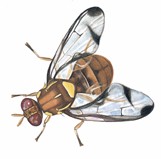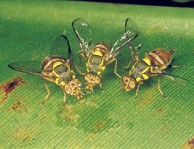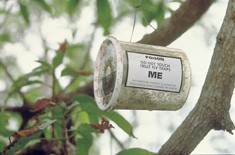
What to look for
Fruit may look healthy, but could be rotten on the inside and full of maggots. Look for small spots on the skin of fruit surrounded by rot.

What you can do
- Do not move fresh fruit south out of the Torres Strait Protected Zone to the Torres Strait Permanent Biosecurity Monitoring Zone, or from either zone to mainland Australia without a permit and an inspection by a departmental biosecurity officer.
- Report any signs of exotic fruit fly to the department by phone on +61 7 4241 7800 or email NAQS.
- There are government fly traps across northern Australia. Don’t move or break them. If you see a broken trap, contact the department by phone or email as listed above so it can be replaced.
Profile
There are more than 150 species of native fruit fly in Australia, but most of these don’t attack commercial crops. It’s the exotic fruit flies present in many of our neighbouring countries that pose high risks to our agricultural industries and could devastate many of the crops we rely on for our food and economic wellbeing.
Identification
Female flies pierce the fruit’s skin to lay their eggs beneath the surface. This introduces bacteria that start the fruit rotting. The eggs develop into maggots, which drink the rotting pulp. Flies can grow from eggs to adults in about four to five weeks. The adults are about 7mm long and look like small wasps. Eggs are about 1–2 mm long and whitish. The maggots are creamy-white and about 12–20 mm long.

Bactrocera trivialis
Distribution
Present in New Guinea and Indonesia are several fruit flies that are not established in Australia, including melon fly and oriental fruit fly.
Threat
In 1995 the establishment of oriental fruit fly (then called papaya fruit fly) threatened fruit crops around Cairns and cost $33.5 million to eradicate. If another outbreak occurred in northern Australia restrictions would likely be placed on the sale of fruit from the infested region to other states and territories, or overseas. Apart from the direct costs to eradicate or control the pest, there would likely be significant impacts on commercial production levels and related jobs and incomes.

A fruit fly trap
Keep a Top Watch!
The most likely way for exotic fruit flies to enter Australia is in infested fruit. All commercial imports of fruit and vegetables are treated to kill maggots or are certified as being grown in a fruit fly-free country or region. Non-commercial imports, such as fruit and vegetables entering Australia with travellers, are destroyed unless accompanied by a valid import permit. The department, through its Northern Australia Quarantine Strategy (NAQS), maintains a network of fruit fly traps across northern Australia. These traps help to check if any new species are entering the country. Don’t move or break them.
Fresh fruit and vegetables are prohibited from entering Australia or moving south from Torres Strait without a permit from the department. Alert the department if you see relatively unripe fruit being attacked by flies .
